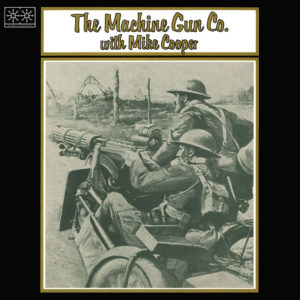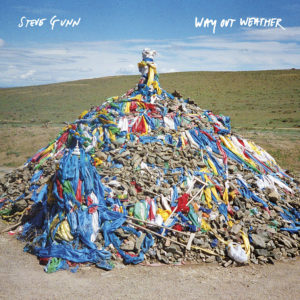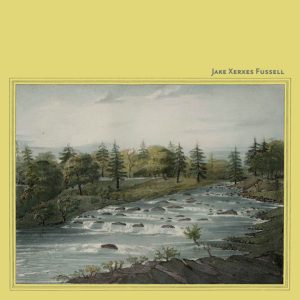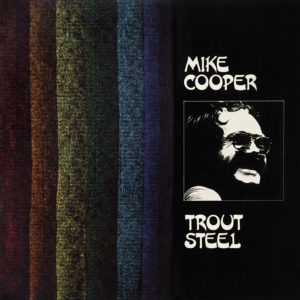Album Narrative
-

-

-

-
With backup singers and the album in the Dead End.
-

-
Chance (center front) and his band.
-

-
Chance as the Stoned Ranger.
-

-

-

-

-

-

-

-
Johnny Cash presenting his guitar to Chance, 1971.
-

-
Chance and the band.
-

-
Chance with the band.
The popular American perception of Nashville has changed radically since 1966, when Charles Portis lovingly lampooned the city’s ambitious, strenuously earnest musicians laboring out on the road and in the honky-tonks night after lonesome night, “singing their songs, some trash, some gold, about hearts and wrecks and teardrops.” What hasn’t changed is Nashville’s predilection for the fertile fringes. By fringe, we don’t mean the variety found on Western shirts, skirts, and Nudie suits, but rather the cultural fringe, the underground realms of outsiders and weirdos prowling their own private, dimly lit lairs on the stoned periphery of the ubiquitous Nashville machine, in the company of likeminded eccentrics and heroes.
As ringleader, maestro, and indomitable troubadour of Nashville’s most private, elusive, and exclusive far-out scene—the Dead End—visionary artist and Nashville lifer Chance Martin (aka Alamo Jones, the Voice in Black aka the Stoned Ranger) could have stepped from the pages of a Portis novel, Barry Hannah story, or Coen Bros. script. After working for and touring with his friend and mentor Johnny Cash as cue card man, stage manager, and lighting designer for eight years, in 1977 Chance began a new life. By the time he was thirty-one, he had already worked stagehands union gigs for all the greats, hung with them and partied with them backstage, and realized that it was now or never—time to turn off all the outside influences, hunker down, and make it new, or else. So he started writing songs on Johnny Cash’s D35 Martin, a gift from the master.
Chance and his gang holed up in the Dead End, the kitted-out “bonus room” above his parents’ garage on a cul-de-sac in a residential South Nashville neighborhood, complete with reel-to-reels, bed, bar, a Head of Security, and a Sergeant at Arms. Under the direction of Chance as guru, they spent five years in secrecy and self-imposed musical isolation, writing songs and recording endless hours of work tapes, periodically emerging under the cover of night, in a convoy of limos and people-movers, to record midnight sessions at the Music Mill and Cowboy Jack Clement’s. (These days Chance hosts a radio show with Cowboy Jack on Sirius XM’s Outlaw Country Station.)
The result was In Search (1981), a fierce, inimitable, and mythmaking countrydelic masterpiece of insular inspiration and absolutely singular vision and scope. Despite its intensely personal origins, long gestation, substantial financial costs, and deadly serious deliberation, the album betrays very little in the way of outside influences or traceable authorship. Commanding, aggressive, and unabashedly masculine, it literally sounds like nothing else we’ve ever heard—this is as close as we’ve gotten to unique music (if there is such a thing), the real deal, an obsessive, private-press triumph of the imagination. The closest analog we can (tentatively) venture is some unholy pot likker of Waylon Jennings, Funkadelic, the Fields of Nephilim, and the Bob Seger System: a strange Southern Gothic, alternately frightening and funky, and utterly transfixing. One can only wonder as to which interstellar channels Chance is tuned, but whatever he’s hearing is not the same transmission that the rest of us hear. And God bless him for it.
Paradise of Bachelors is ecstatic to present the first-ever reissue of this long-coveted collectors’ item, complete with dozens of outrageous photos and a 13,000-word oral history of Chance in a gatefold package. So sit back, listen to this remarkable document, and live with Chance for a spell. Live The Search.
Acknowledgments
Chance Martin’s In Search is the kind of totally warped holy grail artifact that I wish Nashville in the golden era had produced more of. A fully integral sonic rest stop of gratuitous guitar fuzz, wandering beat poetry, nightclub moves, and hi-tech studio possibility, it’s an album for the stoned midnight cowboy, the final port of call for the wild and weird era of the music row outlaws. It’s hard to imagine a record both so intentionally psychedelic and unintentionally cosmic.
– William Tyler
Say Kris Kristofferson, Sly Stone, the ghost of Captain Beefheart, and a small mountain of peyote formed a supergroup in order to create the druggiest disco-rock record in history. This (theoretical) album would be the only workable reference point for In Search… Tempos speed up and slow down unexpectedly, disparate genres collide violently and collapse in piles of busted-up wreckage, and Chance’s vocals veer wildly between a Baptist preacher’s bark and a lounge-lizard purr. The songs sound loose, extemporaneous, and piss-drunk on purpose, and only after endless fine-tuning. Secret musical genius.
– Steven Hyden, Grantland
A lost countrydelic masterpiece from a sideman to the stars. The record sounds like nothing else on earth. It sounds, at times, like Isaac Hayes doing the watusi with Captain Beefheart. Chance’s tales of the Dead End, as detailed in the album’s sleevenotes, are the stuff of screenplays (and may soon become one).
– Alastair McKay, Uncut
7.7. There was just one thing holding Chance back from certain country-music celebrity: The music he made sounded like absolutely nothing else coming out of Nashville at the time, or anywhere else in America for that matter. In Search is a master-class in the art of Going For It, proffering a high-concept, cinematically scaled hodgepodge of loverman soul, outlaw country, blaxpoitation funk, arena-rock pyrotechnics, and Zappa-esque meta-prog that sounds just as confounding and bizarre today as it no doubt did to the few who got to hear it 32 years ago.
– Stuart Berman, Pitchfork
One of the most wondrously strange records to ever emerge out of Music City, USA. God only knows what the Man In Black thought of this mutant hybrid of outlaw country, gonzo psychedelia, coked out funk and soulful slo-jams. We could spend days trying to slot it into a convenient category, but let’s just agree to call it totally fucking unclassifiable, a universe of its own. In the liners (which are worth the price of admission alone) Chance himself reveals the album’s secret ingredients: “Mud, blood and beer!” You’re gonna love it.
– Tyler Wilcox, Aquarium Drunkard
Not only the authentic article, it is virtually unlike any record ever made. This is the sound of the musically mythological brought to tape. The songs reflect the murky yet ecstatic zone Chance and his collaborators discovered, where spaced-out psychedelic rock, hard outlaw country, tough mid-’70s Southern funk, disco, and strutting garage rock commingled and bred a musical dialogue and aesthetic so contradictory it became its own language. It’s excessive yet focused. It’s sprawling, Dionysian, and mercurial, yet earthy and warm. This record is enormous in scope; it cannot be categorized. Electric guitars, basses, tubular bells, keyboards, horns, congas, drums, nature sounds, and a gorgeously soulful female backing chorus all support Martin’s basement-deep baritone that walks a line between Waylon Jennings’, Tony Joe White’s, and Cash’s. In Search is outsider art at its best. Guided by Martin’s vision and shaped via collective process, it uses familiar forms to create a spaced-out language all its own; it is a listening experience like no other.
– Thom Jurek, Allmusic
A surreal, psychedelic, unprecedented and un-imitated album… a lost psychedelic classic, utterly original. Splendidly chaotic celebrations of wine, women and song… One of Nashville music history’s stranger and more compelling albums… in all its unsettling, unusually unusual glory… It stands with Porter Wagoner’s ‘The Rubber Room’ and Jack Blanchard and Misty Morgan’s ‘Tennessee Birdwalk’ as one of the strangest pieces of music to emerge from Nashville, a city that is home to many wild-eyed howlers but that has often produced polished, careful recordings. The album is a testament to the joy of music-making, though it makes me have bizarre, psychedelic dreams if I listen to it too close to bedtime.
– Peter Cooper, The Tennessean
While Johnny Cash portrayed himself as the Man in Black, a lonesome outlaw figure roaming the outskirts of country and western, there was usually one man by his side to act as the Tonto to his Lone Ranger: Chance Martin. From his first note, Martin’s voice is the immediate draw, a version of Cash’s deep, authoritative pipes and sagely storyteller vibe made fresh with bits of wayfaring troubadour and intergalactic shaman. From there, the music does the rest of the psychedelic work, slowly evolving from a dusty country-folk tune with shades of hazy fuzz to an all-out rock and roll freak-out. It’s like if Cash had never married June Carter, instead living out his days in the desert doing peyote and proselytizing folks about the power of broken hearts.
– Chris Coplan, Consequence of Sound
You can’t make this stuff up. Thirty years have done nothing to dull this oddity. In Search is a mind-bending mélange of mescalin-buzzed country-rock, surrealist-manifesto disco, coke-addled funk, and chicken-fried prog. There are no rules in Chance’s world, so if he wants to indulge some easy-listening strings, make like Barry White visiting a Stuckey’s, or drop “Theme from ‘Peter Gunn’” right in the middle of a song…who’s going to tell him no? It sounds like a man cramming a lifetime of musical dares into 70 minutes of music… but Martin’s sense of humor — self-deprecating, self-deflating, but somehow self-mythologizing — ensures you won’t turn it off until the last cosmic notes of closer “Drema” have faded.
– Stephen Deusner, eMusic
Given the customarily expansive PoB packaging treatment, it emerges as a work of staggering uniqueness, “countrydelic” only hinting at the rampant sonic alchemy running amok as, say, “Sunn of Gunn” sees Chance ranting over mutant JBs funk in lysergic reverb before steaming into “Peter Gunn.” Whether invoking Funkadelic in Nudie suits or booming that he’s “Too High to Land,” Chance created one of the `80’s weirdest, most evocative albums.
– Kris Needs, Shindig!
In Search is an immersion. This album is not necessarily for casual listening—it’s not one for the carpool. Its sheen is not the typical luster of a cache of polished golden coins, but an opaque patina more befitting the motley bounty of a lifelong maverick. Chance’s sultry baritone and meandering guitar work ushered me into a forty-minute time capsule and I came out the other side confused, mystified, intoxicated. I’d been to the Dead End and back. It’s a helluva trip.
– Maxwell George, The Oxford American
A countrydelic odyssey bridging raunchy funk and idyllic pop, outlaw balladry and Technicolor acid tests. It could have been a classic… Think Cash in a narcotic rage.
– Jordan Lawrence, The Nashville Scene
An otherworldly mix of country, garage, and psychedelia, a little-heard Southern Gothic gem delivered by a spacesuit-wearing lovin’ man. A countrydelic masterpiece.
– Kyle McGovern, Spin
4 stars. Folk, country, and jazz wrapped in a blanket of psychedelic rock, a perfect representation of rock and roll in the time of its creation, yet unmistakably one of a kind and very well executed… carrying a sense of unabashed rebellion, with a likeness to Frank Zappa. This creates an interesting vibe leveling any sort of predictability in the sound, which flows beautifully. There’s only one question, I guess: how come I never heard of this before?
– Natasha Grant, Artrocker
The best stuff here meshes Chance’s strange, low delivery—sometimes it’s like he’s singing in a musical about psychedelic music, like he’s some underground, over-the-top crooner—with airtight yet surprising songcraft. It’s clear that Chance was one of a kind, and so is this record.
– Matthew Fiander, PopMatters
Filled with psychedelic flourishes that sound like Hawkwind and Frank Zappa backing Waylon Jennings. There’s a frantic, somewhat dark and unhinged quality to this previously lost recording that helped make it a collectable rarity for decades.
– Hal Horowitz, American Songwriter
A cosmic shit-kicker of a tune if there ever was one, “Mr. Freedom Man” moves from a spacey synth intro to a hard-hitting, should-be-a-biker-anthem with acidic guitar solos galore.
– East Village Radio
The songs are great, anchored in old-school twang and irreverent humor… but the stories that Chance tells in the accompanying oral history are worth a listen, too.
– American Songwriter
Must be heard to be believed. If you like music that pushes boundaries, In Search is the record for you.
– Jeffrey Sisk, Pittsburgh Daily News





















